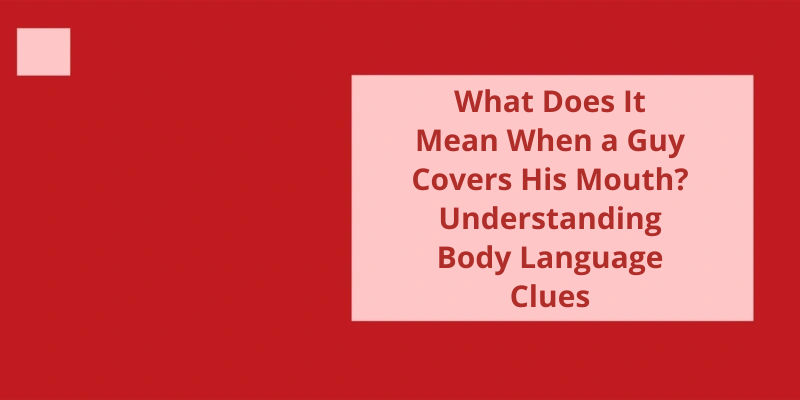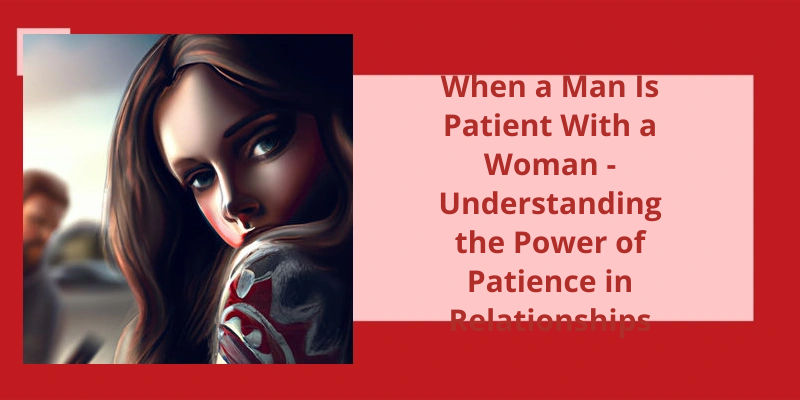Non-verbal cues are just as important as spoken language when it comes to communication. In fact, they often reveal more about a person's true feelings and intentions than their words do. One such gesture that can provide valuable insight into someone's mindset is when a guy covers his mouth. Depending on the context, this gesture can convey vastly different meanings. If he uses it while speaking, it indicates that he may be hiding something or telling a lie. On the other hand, if he covers his mouth while someone else is talking, it suggests that he believes they’re being dishonest. Understanding the nuances of body language can greatly enhance one's ability to discern the truth and connect with others.
What Does Covering Your Mouth Symbolize?
The act of covering your mouth dates back to ancient times. In many cultures, it was believed that evil spirits would try to enter a persons body through their open mouth. Covering the mouth was therefore seen as a way to protect oneself from these spirits. Additionally, covering ones mouth was a sign of respect and humility. It was used when speaking to those in positions of authority or when in the presence of others who were deemed to be superior.
Today, it’s often seen as a way to show embarrassment or shame. When someone says something embarrassing or inappropriate, they may instinctively cover their mouth as a way to hide their words. Similarly, when someone is caught in a lie, they may cover their mouth to avoid being caught.
In some cases, covering the mouth can also be a sign of discomfort or anxiety. When someone is nervous or afraid, they may cover their mouth as a way to protect themselves. This could be a way to shield themselves from potential danger or to keep themselves from saying something they might regret.
It can represent many things, from respect and humility to embarrassment and shame. It’s a powerful form of nonverbal communication that people use to express their thoughts and emotions.
Now that we’ve discussed what it means when someone covers their mouth with their hand, let’s take a closer look at what this gesture signifies in the field of psychology. While it may seem like a simple physical action, hand-over-mouth can actually reveal a great deal about a person’s emotional state and inner thoughts. By understanding the psychology behind this gesture, we can gain a deeper insight into the workings of the human mind and the complex ways in which we communicate with one another.
What Does Hand Over Mouth Mean in Psychology?
Anxiety and Nervousness. Hand over mouth can also be an indicator of someone feeling anxious or nervous in a particular situation. When someone is feeling uncomfortable about a situation, you might observe them automatically put their hand over their mouth as they hold back from speaking their mind or expressing their thoughts. The gesture could also be a way of trying to control or soothe a racing heartbeat and the resulting cascade of emotions.
Guilt and Shame. Feeling guilty or ashamed of something that’s been said or done can result in the hand over mouth gesture as well. In psychology, this action is known as body language leakage as it exposes a persons unintended thoughts or emotions. People who feel regretful or worried about the consequences of their actions often cover their mouth as a sign of shame, and they might even take self-deprecating actions in an attempt to take the spotlight off their mistake.
Embarrassment and Social Awkwardness. Hand over mouth often happens when people become self-aware of their actions or speech while in the company of others. They might apologize or distance themselves from their comment or perception by using this hand gesture, which could also be a sign of embarrassment or social awkwardness. Psychology of communication explains that recognizing when someone is feeling uneasy or embarrassed about a situation is essential in avoiding any further unpleasantness.
Nonverbal Communication. The hand over mouth gesture in psychology is an example of nonverbal communication, used to convey a range of emotions, feelings, and thoughts. Gestures and facial expressions are important indicators of a persons emotional state, and understanding them is fundamental to effective communication. In everyday life, we use a range of hand gestures to communicate our emotions without saying a word. By paying attention to these subtle signals, we can gain a more accurate understanding of what someone is trying to express.
It’s important to differentiate between someone innocently scratching their nose or rubbing their lips, which could mean they’re simply feeling itchy versus someone intentionally covering their mouth. Understanding the psychology behind this gesture can be helpful in both personal and professional interactions.
Body language is a complex and nuanced form of communication that we all engage in, whether we realize it or not. And one common gesture that’s puzzled many people is the habit of covering one’s mouth. While it may seem like a simple reflex, there are actually many potential reasons why a person might choose to cover up their smile or frown. In this article, we’ll explore some of the psychological and cultural factors that can influence this subtle gesture and what it might reveal about our inner thoughts and feelings.
Why Do People Cover Their Mouth Body Language?
In some cases, a smile may simply be a polite gesture or an attempt to put others at ease. By covering their mouth, people may be attempting to hide these emotions and avoid giving away their true feelings.
Another reason why people cover their mouth in body language may be to maintain a sense of privacy or to avoid being overheard. For example, if a person is speaking on the phone in a public place, they may cover their mouth to prevent others from hearing their conversation.
People may also cover their mouth in response to anxiety or stress. When a person is feeling nervous or anxious, they may instinctively cover their mouth with their hand as a way of soothing themselves. This gesture can help to regulate breathing and calm the nervous system, helping the person to feel more relaxed and in control.
Just as some people fidget or twirl their hair when they’re nervous, others may cover their mouth for no apparent reason. In some cases, this may be a subconscious expression of anxiety or discomfort, while in other cases it may simply be a habit that the person has developed over time. Regardless of the reason, this gesture can convey a wide range of emotions and attitudes, making it an important aspect of nonverbal communication.
Laughing and smiling are universally recognized as positive social cues. However, different cultures interpret and express these cues in unique ways. In some parts of the world, covering one’s mouth while laughing isn’t only considered polite, but is actually a sign of good manners. Let’s explore the various meanings and cultural contexts behind this curious habit.
What Does It Mean When Someone Covers Their Mouth While Laughing?
There are various interpretations as to why someone would cover their mouth while laughing. Some say that it’s simply a behavior rooted in cultural etiquette. In many Asian cultures, for example, covering one’s mouth when laughing or smiling is seen as a form of good manners. It’s considered polite not to show one’s teeth in public, particularly for women. On the other hand, if someone is laughing hilariously, they may cover their mouth to stop themselves from laughing out loud.
However, there are also psychological interpretations to this behavior. Further, experts suggest that some people may cover their mouths subconsciously to avoid showing their true emotions. Similarly, to hide embarrassment or shyness, some people may also use their hands to cover their mouths.
Studies suggest that because laughter aides digestion, our bodies have developed an evolutionary adaptation to cover our mouths when laughing to prevent food from coming out of our mouths. The “Fight or Flight” response, for example, could trigger an individual to cover their mouth as a protective instinct.
In some instances, covering the mouth during laughter could also indicate that someone is being deceitful. People who’re trying to hide certain intentions or emotions may cover their mouth as a nonverbal cue to deceive others.
While it might be a cultural habit or rooted in good manners, it could also be an indication of self-consciousness, a way of hiding ones true feelings, or a natural response. Ultimately, the interpretation depends on the person, culture, or situation where the behavior is happening.
Proper etiquette is an essential aspect of any formal or informal setting. It indicates respect, civility, and consideration for the people around you. Today, we will delve into one aspect of good manners that’s frequently overlooked in discussions about etiquette – covering your mouth when eating. Despite being a basic social norm, it’s often ignored, leading to discomfort and embarrassment for others. So, is it good manners to cover your mouth when eating? Let’s find out.
Is It Good Manners to Cover Your Mouth When Eating?
The act of covering your mouth while eating is considered good manners in many cultures. It’s a common practice to show respect and consideration for others around you. When you cover your mouth while eating, you’re preventing food particles from flying out of your mouth and landing on other people or surfaces. This is especially important in public settings such as restaurants, where people are in close proximity to each other.
In addition to preventing food particles from flying out, covering your mouth while eating can also help prevent bad breath. When you chew with your mouth open, the food particles mix with the air, causing an unpleasant odor. By covering your mouth, you’re reducing the amount of air that comes into contact with the food and therefore reducing the odor.
It helps prevent food particles from flying out and landing on others or surfaces, reduces bad breath, and shows respect for the food that you’re eating. So, the next time you find yourself chewing with your mouth open, remember to cover your mouth with your hand.
The Negative Effects of Chewing With Your Mouth Open
- It’s considered impolite and can be seen as a sign of poor manners.
- It can make it difficult for others to focus or concentrate on anything but the noise.
- It can lead to negative reactions from others, including disgust and annoyance.
- It can be distracting and disrupt conversations and social situations.
- It can create physical discomfort for those who’re forced to hear the noise.
Conclusion
In conclusion, the act of covering one's mouth can convey a range of meanings, be it nervousness, secrecy or even deceit. Therefore, it’s important to consider the context and the person's intentions before drawing any conclusions. As humans, we often rely on nonverbal cues to interpret social interactions, but it's crucial to remember that they aren’t always definitive. Ultimately, effective communication requires honesty, transparency, and an open mind. So, the next time you notice someone covering their mouth, approach the situation with curiosity and empathy, rather than assuming the worst. Remember that communication is a complex and nuanced process, and it's up to each one of us to foster healthy and authentic connections.






